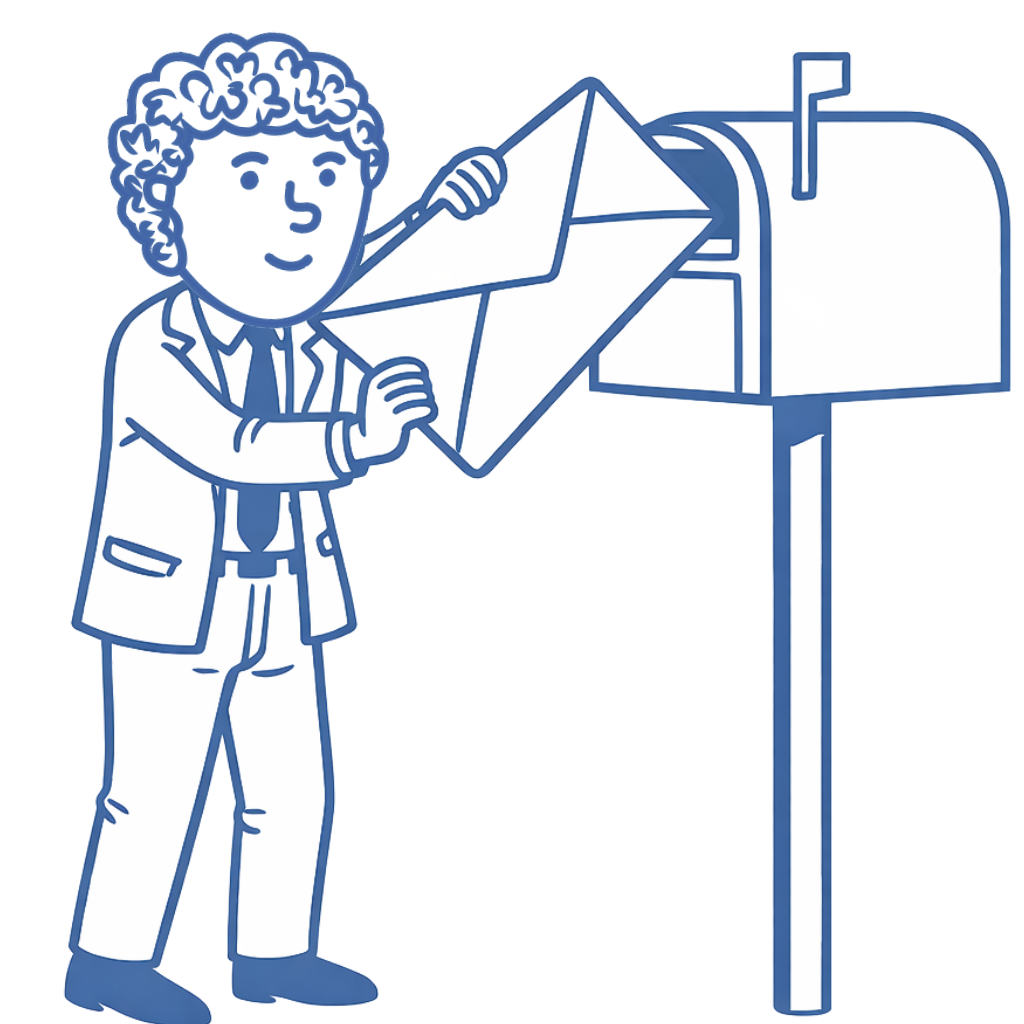Table of Contents
- Personalization and quality over quantity are critical for effective cold email outreach and avoiding spam filters.
- Use compelling, data-driven storytelling and visuals (e.g., maps, tables) to increase PR pitch success and journalist engagement.
- Segment outreach by intent—PR, link building, affiliate, or influencer—and tailor templates to each scenario for maximum impact.
- Follow-ups nearly double reply rates; personalize and test new angles to re-engage unresponsive contacts.
- AI tools can assist in drafting outreach templates but require clear prompts and manual personalization for best results.
With email outreach, you get out what you put in. If you don’t put the time and effort to personalize your email outreach, you will most likely get little to no results.
Like in link building, quality beats quantity with email outreach. You don’t need 1,000 emails to get ten mediocre results. You could send 100 or 50 highly-targeted emails to get ten solid results. (We’ve actually seen this in our studies.)
The less spam we put out, the more our outreach gets ignored, making it harder for ourselves in the long run.
With that out of the way, here are our favorite email outreach templates to help you reach your targets, get those links, earn some coverage, and win those deals.
What is Cold Email Outreach?
“Cold outreach” is usually meant to mean reaching someone you’ve never met before. You then “warm” the prospect up over time until that prospect becomes a sale.
But too often, cold emails go right out of the gate for the sale. There’s no effort to personalize or build a relationship.
With Google’s new email requirements to reduce spam starting Feb 2024, cold outreach may take a critical blow if you aren’t personalizing.
Any way you can connect to your target, the better your chances of getting them to take action.
The remainder of this post is a collection of cold email outreach templates broken down into specific industries for easy browsing.
PR Outreach Templates
In the fast-moving world of PR, getting placements depends on many things going right. The one thing you should always be able to count on is your outreach email.
Hannah Smith of Worderist stresses that “you can follow the template structure below, but if you’ve failed to uncover the most compelling stories from your data, you still won’t secure coverage.
I suspect that whether or not you secure coverage is more down to factors like how compelling (or otherwise) the story you’re selling in is, plus whether or not you’re taking that story to the most appropriate journalists.”
We’ve covered tips on successful survey ideation in the past, so the next step is distributing your content. This section delves into crafting templates that resonate with your target, ensuring your emails yield coverage.
1. Survey Post or Data Study
When pitching a survey post, highlighting the key takeaways is the most effective way to inspire your target to cover your post.
Some journalists like to dive into your data and extract their insights, but most don’t have the time, so they look to you to point out the most critical aspects (which they may confirm themselves.)
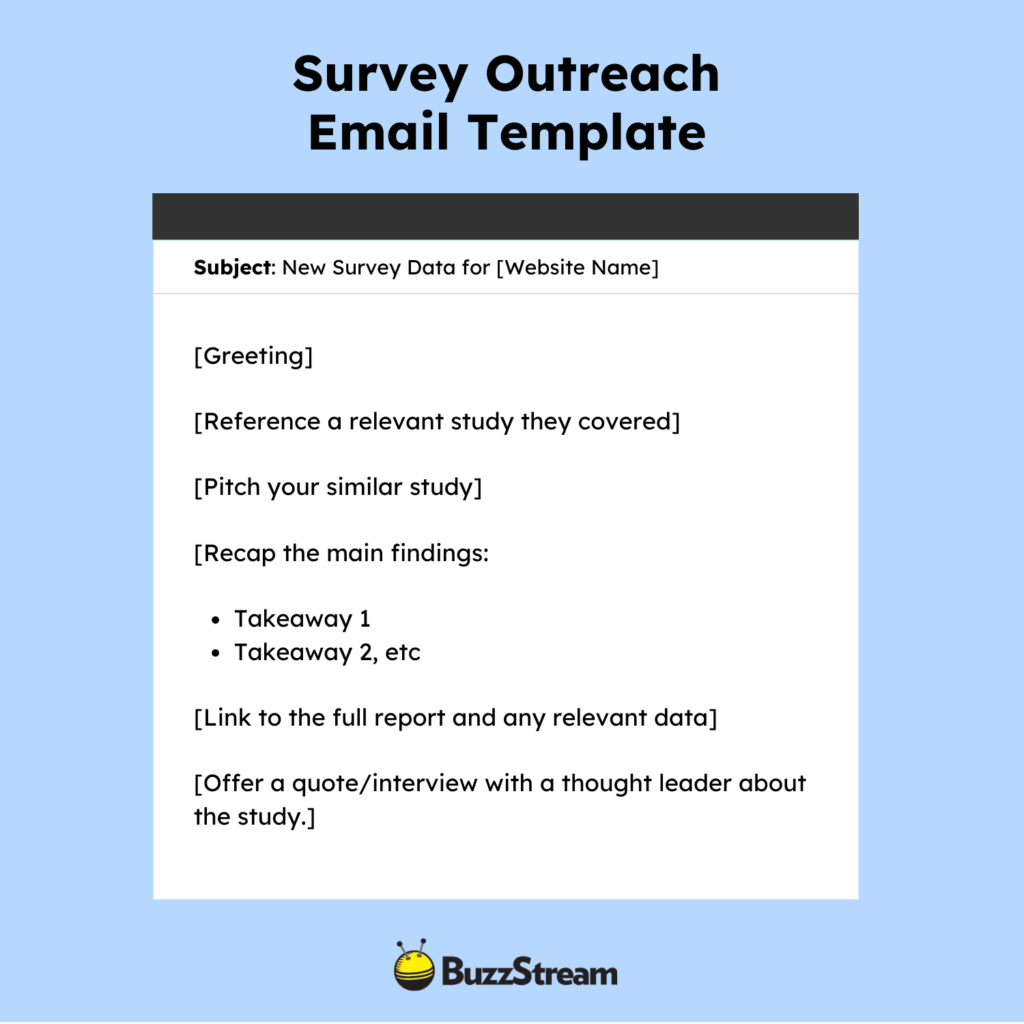
Here is a successful template used by Jodie Booras of Kaiona Communications to secure coverage from major news outlets across the globe.
Hi [First Name],I read your recent [Research Page Title] on [Website Name], and since you regularly cover [Topic], I thought you might be interested in the [Topic/Title] report that was just released by [Your Site/Company].
- Takeaway 1
- Takeaway 2
- Takeaway 3
The full report can be found here [link to report/press release].
[Name], [Title] at [Company], [short bio to validate their expertise on the subject]. [He/she] is available to elaborate further on the findings in this report. If you would be interested in speaking with [Him/Her], I would be happy to set up a call.
If time does not permit a call, I am also happy to provide answers to specific questions you may have on the subject, or provide a quote for you.
I look forward to hearing from you soon.
Why does this work so well? Jodie says:
“Journalists love data, but sometimes it is not easy to come across.
If you can provide them with useful, relevant data it makes their jobs much easier and you become a highly valued partner/source for them.
When pitching the data, be sure to call out why it is relevant to them and their audience. WIIFM?”
Some journalists don’t need to see an article referenced in their email. It adds time to your pitch process and can be tough to scale. But, personalizing by referencing an article can sometimes help your email stand out.
2. Data Pitch With Images or Tables
PRs often vary on the amount of information they share within a post. The previous email template could easily be used to include an image or tables, but I wanted to provide an alternative from another expert in the space.
This email template below comes from Luke Doyle, a Digital PR Lead at Cedarwood Digital.
The best and worst rated [topic] in [country], according to [data source]
Hi [First Name],
[Greeting]
[Leading stat from the study]
That’s according to [Client name], which crunched the numbers to reveal [campaign title]: [Target URL]
[Line about the ‘why’ and methodology]
This map shows the [lead angle]:
[Annotated image]
Key findings:
[List]
Do you think your readers would find this interesting?
If this would work as a story, you’ll find the full press kit and embed code for the interactive maps here:
[Link to press kit and embed code for interactive maps]
Best,
As you can see, this is more for a data-driven city study-type post.
For more context, here it is in real life:
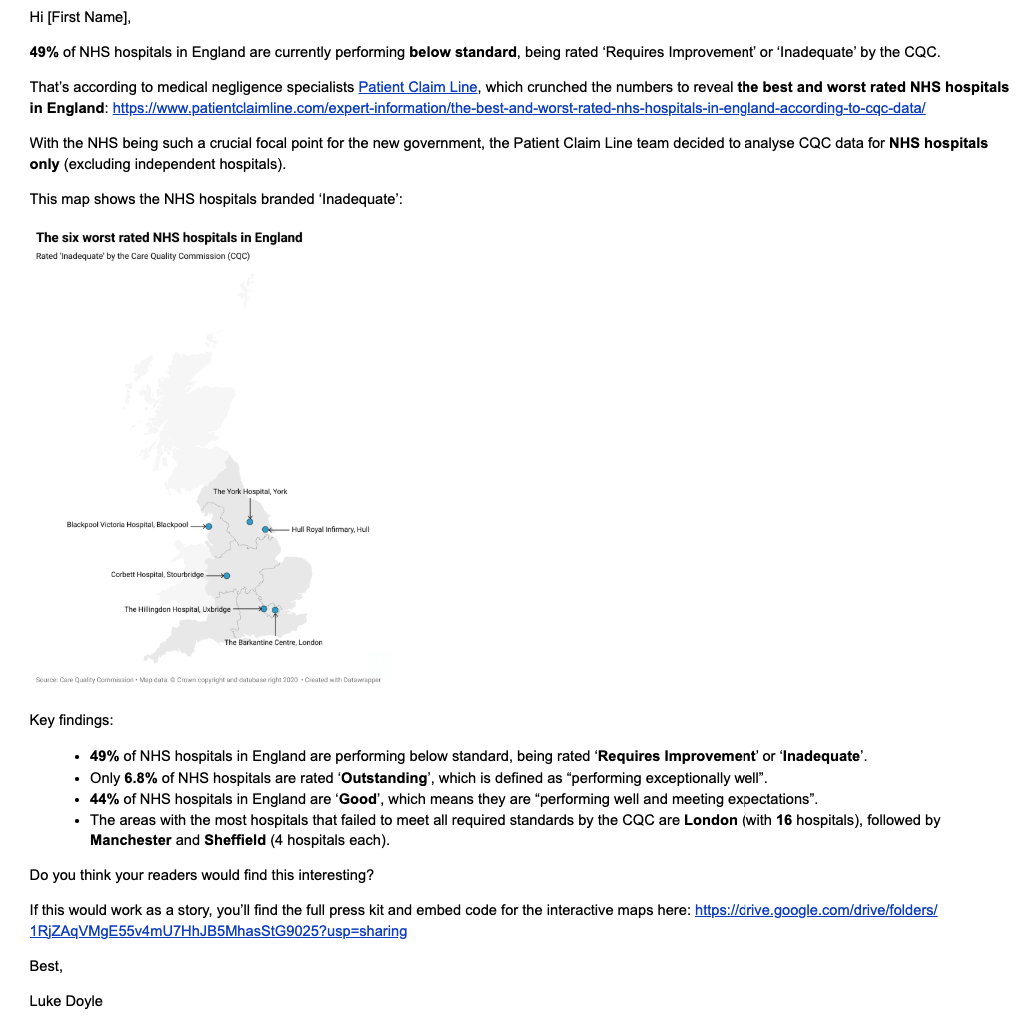
Luke told me that this pitch worked for a number of reasons:
- We included a map so readers could quickly visualise where the worst rated hospitals are.
- We have four eye-catching bulleted key findings.
- We linked out to a Drive folder, containing the press release and embed code for interactive maps.
Overall, it follows the theme of providing enough information so that the recipient of the email can easily decide whether it is right for them and take action.
I’ll cover this again later in this post, but I wanted to also highlight their follow-up process.
Check out how they altered the original pitch a bit:
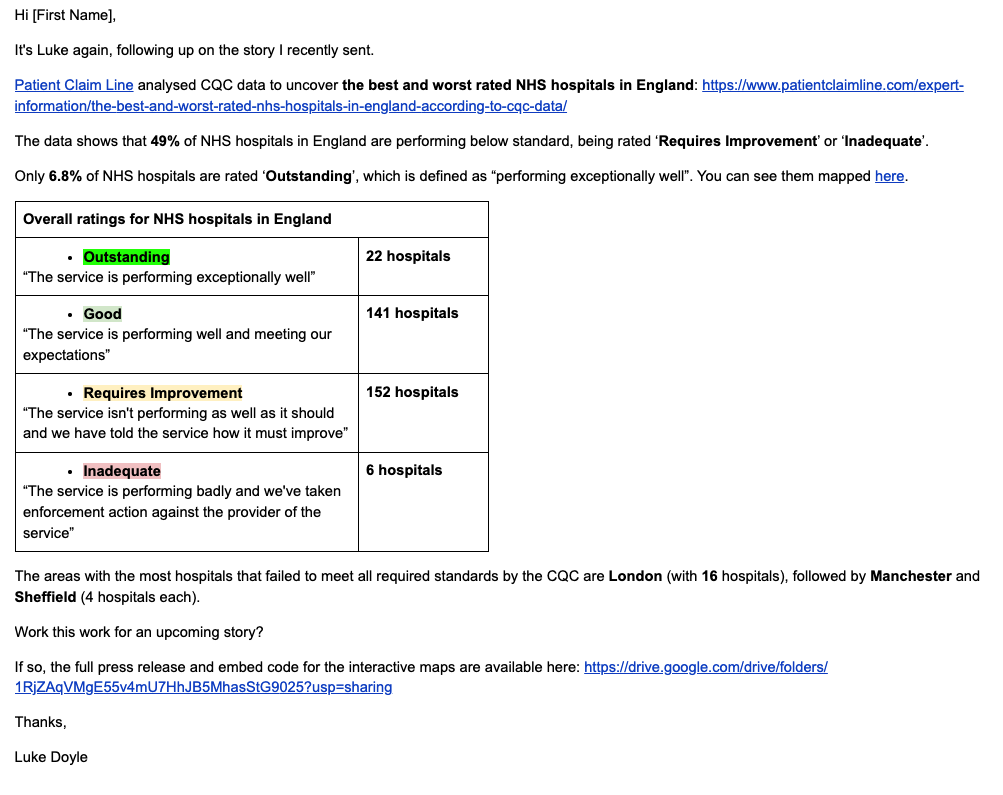
The same information exists, but this time, there is a helpful table to make it even easier to glean insights.
And it worked wonders too! About 160 emails sent, and they got 25 pieces of coverage, including links from The Sun and The Express.
3. Press Releases
Like those outlined in our digital PR tools post, many press release platforms provide distribution networks. But if you are doing your own pitching, a press release template is a great building block for all types of pitching.
You’ll first need a press release. Discover the anatomy of a perfect press release to ensure you cover the most compelling information.
Then, use Jodie’s recommendation for a press release email pitch template.
Hi [First Name],I read your recent [Research Page Title] on [Website Name]. Since you regularly cover [Topic], I thought today’s announcement about [Topic] by [Company] might be of interest to you and your audience.
[Company], [PR Lead In], today announced [1 sentence high-level description of announcement].(Add 1-2 sentences explaining why this is significant.)
What does this mean for the [Industry] industry?
- Key takeaway 1
- Key takeaway 2
- (Key takeaway 3)
The full press release can be found here. [Link to report or press release]
[Name], [Title] at [Company], [short bio to validate their expertise on the subject]. [He/She] is available to answer any questions you may have about this. If you would be interested in speaking with [him/her], I would be happy to set up a call.
If time does not permit a call, I am also happy to provide answers to specific questions you may have, or provide a quote for you.
I look forward to hearing from you soon.
Jodie reminds us that “journalists receive hundreds of email pitches and press releases a day.
Make their job easier by using bullet points to allow them to quickly and easily see the key takeaways of your news and give them a head start on potentially covering it.”
4. Quote/Interviews/Influencer Campaigns
Pitching quotes from a thought leader, C-suite executive, or relevant spokesperson for a third-party report or news event is a great way to get press mentions and links.
Jodie’s insight:
“When any news breaks in an industry, being able to offer quick sources to comment on that news and how it will affect the industry is key.
It is important to highlight what unique angle or perspective your source is offering and what makes them credible on the topic.”
Hi [First Name],As you may have seen, the latest [Subject] report by [Company] was just released revealing [1-2 Takeaways].
As this [report/news] outlines, this will affect [industry] by [point from report or news.]
What some may not realize however is [offer a high-level tease of your SME’s unique perspective.]
[Name], [Title] at [Company], [short bio to validate their expertise on the subject] is available to elaborate further on this perspective.
If you would be interested in speaking with [him/her], I would be happy to set up a call.If time does not permit a call, I am also happy to provide answers to specific questions you may have on the subject, or provide a quote for you.
I look forward to hearing from you soon.
5. Quotes/Interviews/Influencer Campaign with a Press Release
I wanted to provide an alternate look, so I asked Robyn Munro at Vega Comms how they pitch.
This was for an influencer campaign. They reached out to someone, got their insights, and pitched that to journalists.
Here is their template:
Hey [First Name],Intro and hook (one sentence) Introducing the brand and linking to the brand.
Key talking points (bullet points) (four max)
End the pitch by offering any additional quotes or anything else that might help the journalists.
Thanks,
The email template itself is very simple and straightforward, which I love.
When you see it in action, you can get a sense of how it works:
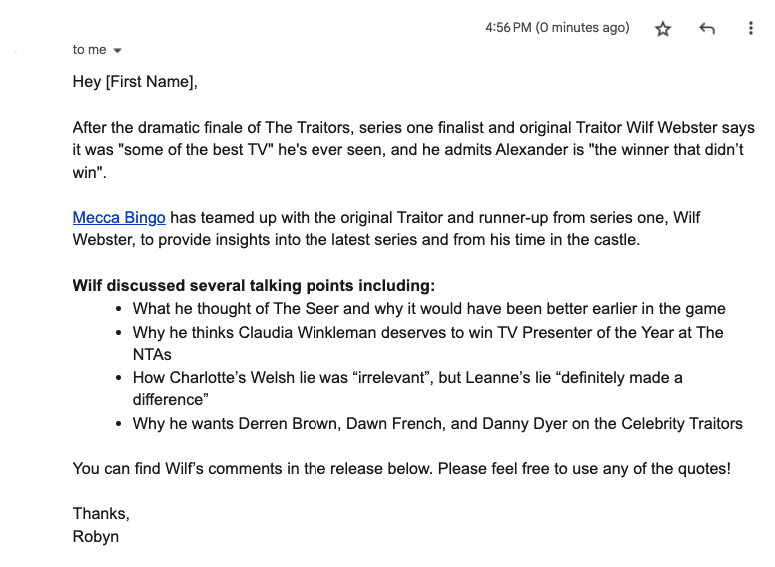
Robyn told me, “It worked because it gets straight to the point—exactly what journalists need. They don’t have time to sift through an entire press release; they want a concise, compelling summary in the pitch.
Since their attention is limited, it’s crucial to capture their interest quickly and emphasise the key takeaways.
While this campaign was influencer-led, the same approach applies to data-driven pieces—highlighting the most impactful data points to make the pitch stand out.”
And it ultimately got them 38 links, including Radio Times, Digital Spy, Daily Star, and Evening Standard. All highly authoritative publications with a high DA!
6. Responding to a Journalist Request
Finding and responding to journalist requests is easier between Source of Sources and X.
However, if you aren’t using a platform like Qwoted, you must email journalists directly.
So, I spoke with previous podcast guest and expert PR, Olivia Lott, on her email template for responding to journalist requests.
Here is the general format she followed:
I have some [Tips, Answers, Quotes] from [Brand/Website Name].
[Respond to request in detail]
Please let me know if you need anything else.
When we see it in template form, it’s hard to point out what makes this so helpful for a journalist. I had to alter Olivia’s original email so as to not give away any proprietary information.
But, in the below, you can see that she provided an extensive amount of detail.

When I asked Olivia why this works so well, here were a few reasons she called out why this worked:
- I’ve made sure my pitch genuinely answers exactly what the journalist has asked for and gets straight to the point
- I’ve formatted it to make it as clear and as scannable as possible, while still making sure it has all the core info in there
- I offered comments from a relevant expert (not essential, but it certainly helped!)
And if you’re wondering how it did, she got the placement.

We covered a few more ways to respond to journalist requests in our post.
Blog Post Promotion
Whenever I have a new blog post I want to promote, I ask myself: what’s the value I’m offering?
Sometimes, you might create a shareable, like an infographic (which is covered below in the link building section.)
However, promoting a blog post doesn’t always have to be about building links.
Here are some email outreach templates for blog post promotion:
7. Before Publish: Expert Commentary Request
One of my favorite tactics for getting a blog post promoted is to first ask users to add something to your post before it’s published.
Then, once it goes live, you let them know, and it’s more likely that they will link or share it because it features them.
The template looks something like this:
I’m working on a post about [Topic].
I’d love if you could provide me with [request].
Here’s exactly what I’ll need.
- Detail 1
- Detail 2
- Detail 3
The deadline for this project is [Date].
Please let me know if you are interested!
For a very meta example of this, I asked Jodie Booras (among others) for her help in providing some examples for this very post you are reading right now.
Here’s what my email looked like in action:
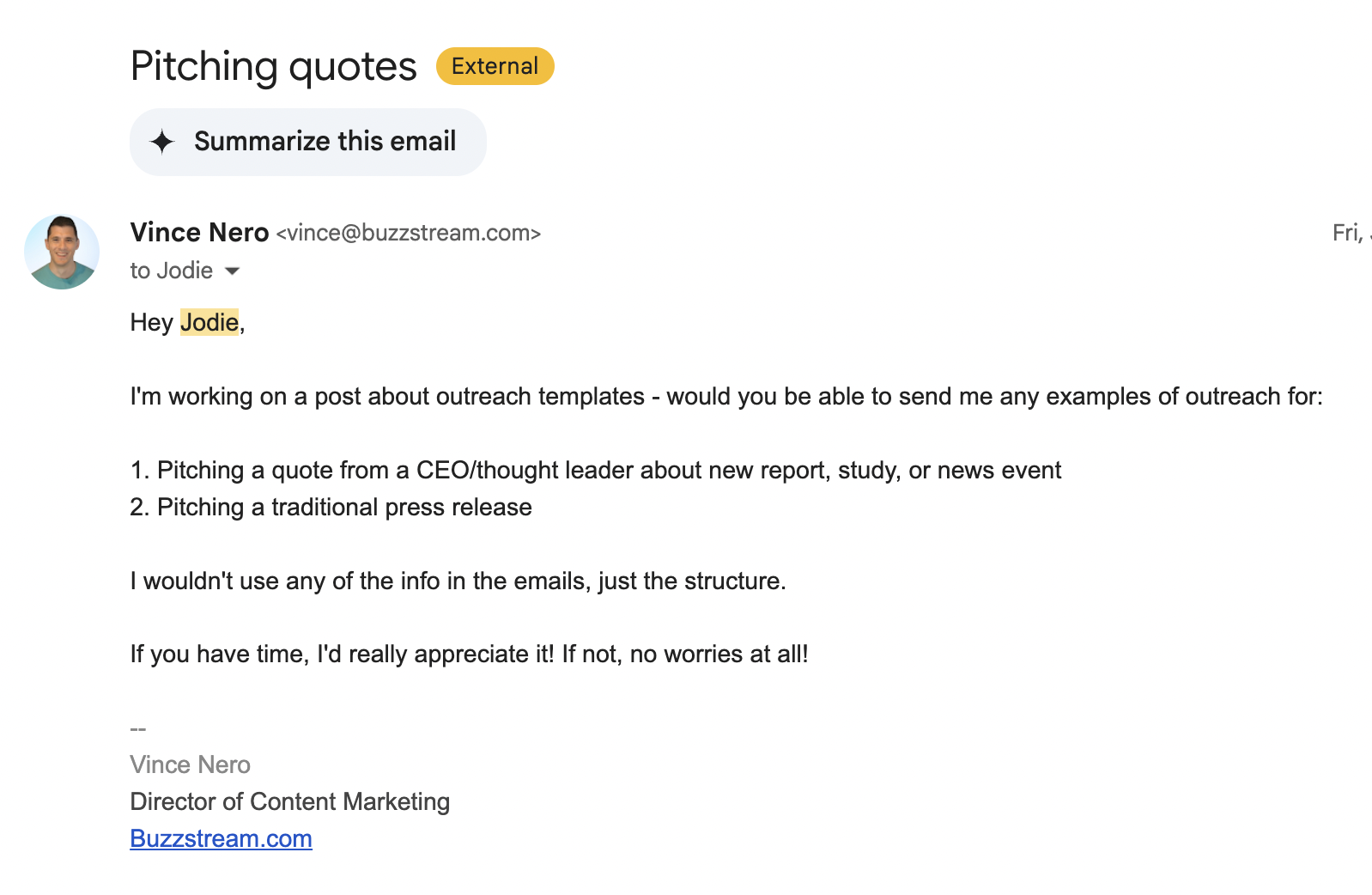
8. After Blog Post Publish: Mention Outreach
This approach plays in tandem with the previous though the previous isn’t always necessary. In some cases, like our digital PR tools or PR podcasts posts, I may reference brands within the article.
Then, when it goes live, I want them to know that I referenced them.
If you’ve referenced them without asking for contribution, use this template:
Hi [First Name],I just wanted to let you know that I mentioned [Site Name] in post about [Topic] entitle: [Post Title].
You can see the excerpt here: [Excerpt]
The full post can be found here: [Post Link].
If there’s anything that you’d like to change, please let me know.If you have the opportunity to promote it on your blog and/or social, I’d greatly appreciate it.
Thanks,
[Your Name]
For instance, here’s an email I used after posting our SEO extensions post:

As you can see, this works because it tells them exactly where and how they are mentioned.
If they are already aware of the blog post because you’ve asked them for a contribution, use this template:
Hey[First Name],Thanks again for your contribution to [Post Title].
The post is now live: [Link to post]
If you have the opportunity to promote it on your blog and/or social, I’d greatly appreciate it.
Thanks!
For example, here it is in action when I emailed Jodie:
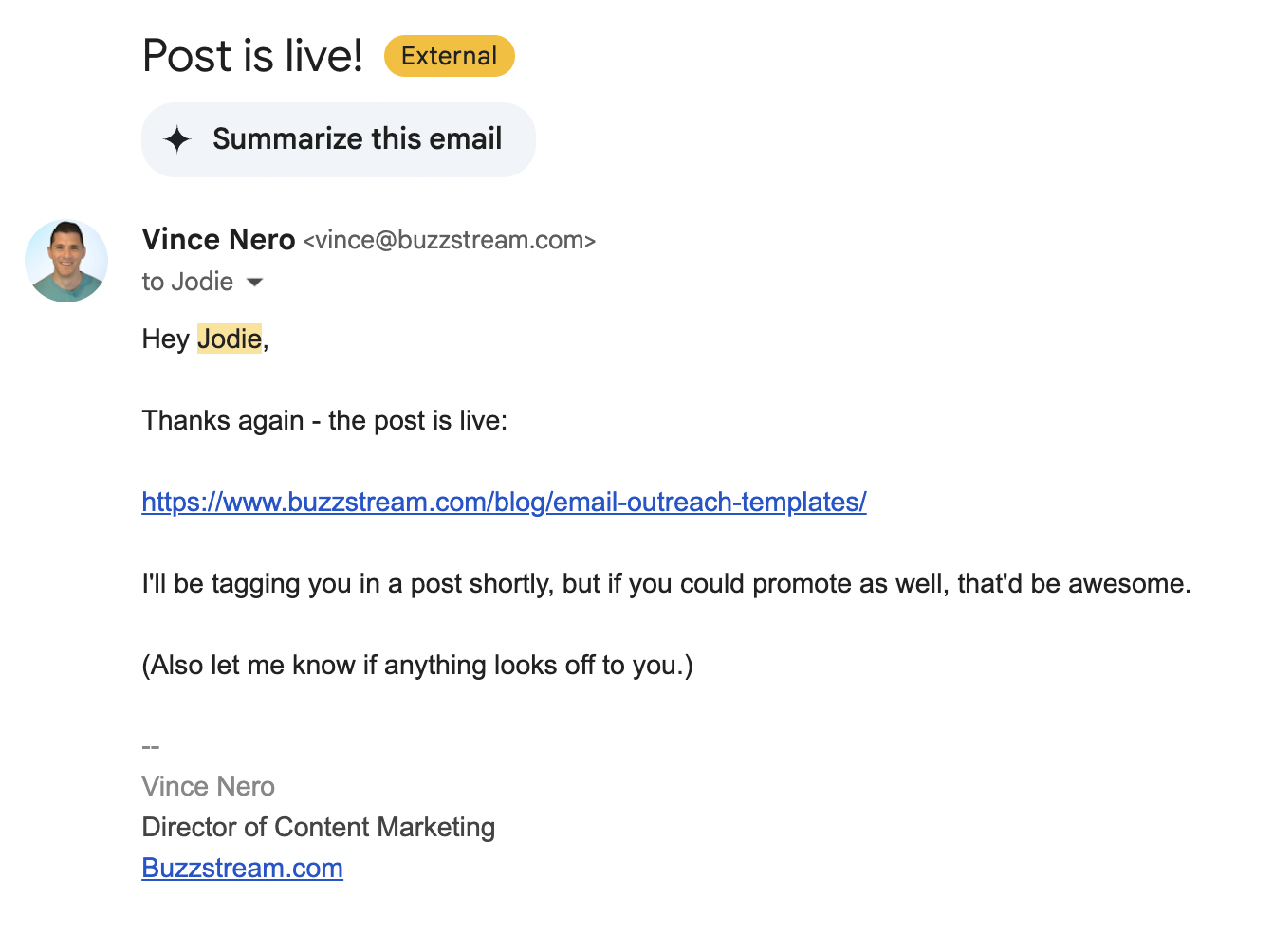
My emails are a little more casual, mainly because I’ve established a relationship with Jodie before including her. But I always let them know where they are mentioned.
Link Building Outreach
Link building techniques have changed significantly, but many tactics still work well. Below are the most effective templates for link builders who want to personalize their outreach to boost their approach. Each is based on my years of experience with agencies like Siege Media and The Grit Group.
9. Guest Post with Specific Pitch
When pitching a guest post idea, the golden rule is to follow the writer’s guidelines on the target site. Some will have specific words to include in a subject line; others may also want the entire pitch in a Word Doc or Google Form. For example, here are the guest post guidelines from the Hubspot blog.
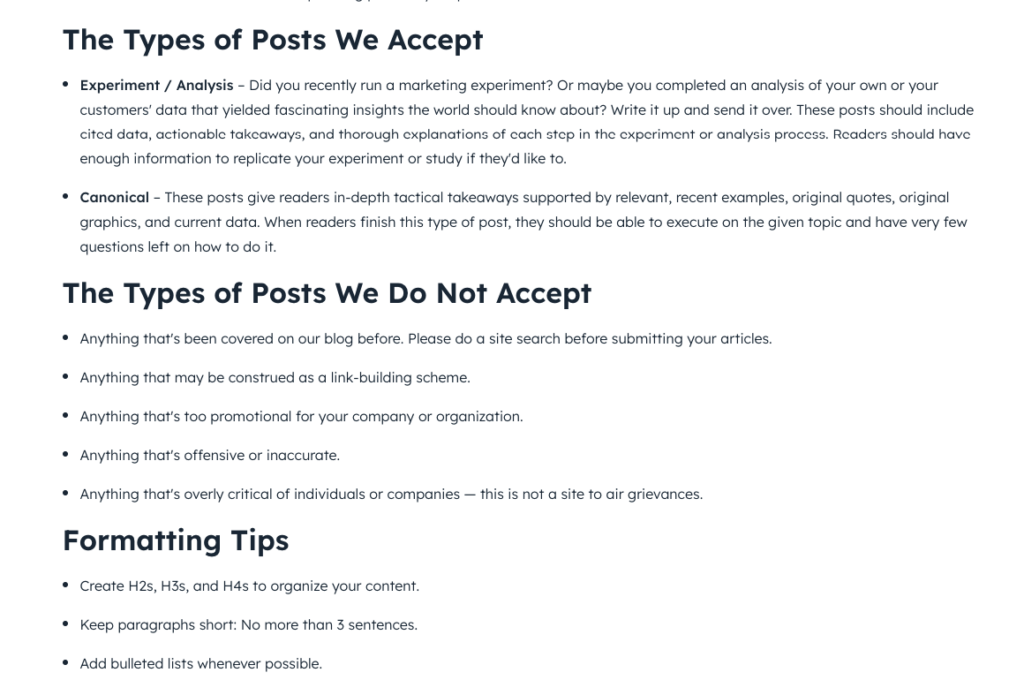
If you miss those guidelines, don’t expect your email to get read.
With any pitch, you’ll need a strong post idea and clarify why your target will benefit from including your post on their site. Don’t be afraid to show off by linking to authoritative, relevant sites where you have written lately.
Pitching to Someone Who Accepts Guest Posts
You can find 150+ high-quality guest post sites on our blog with links to their guidelines.
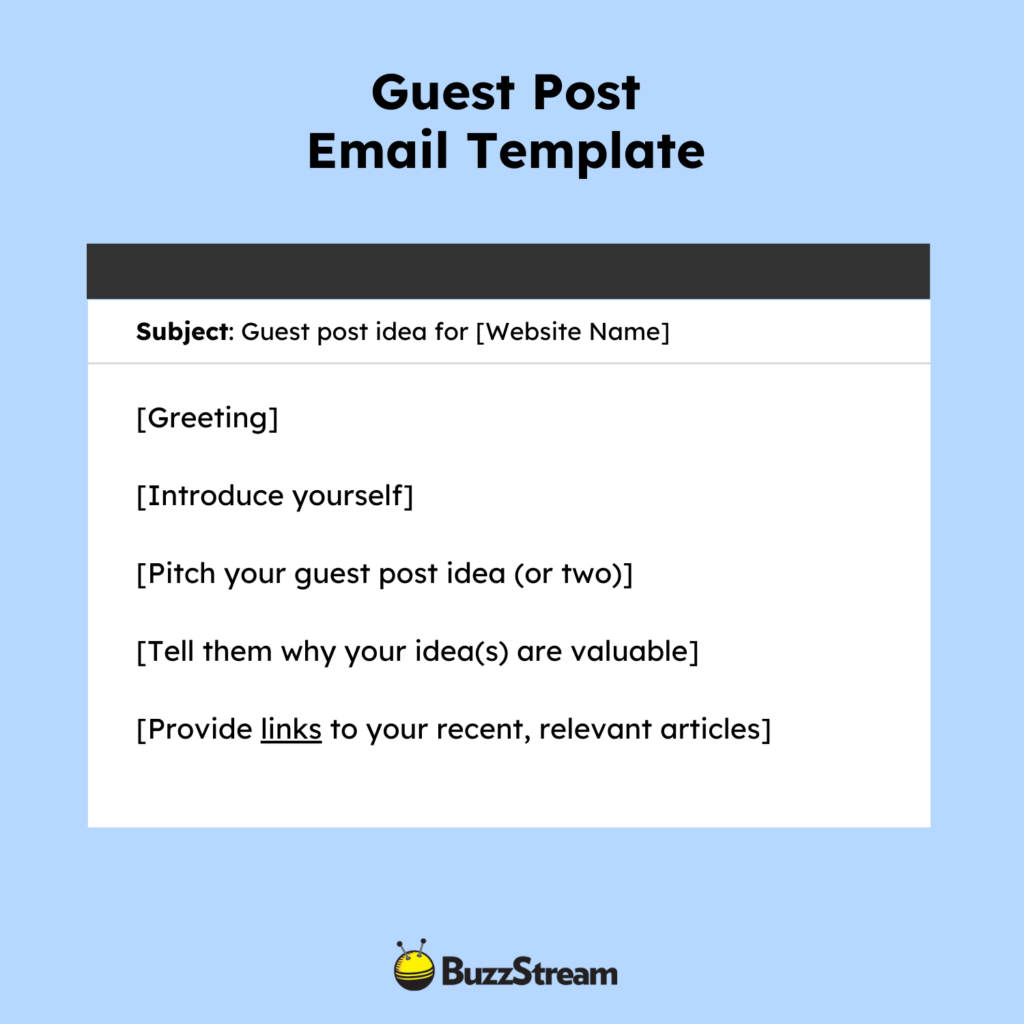
Here is a more specific guest post outreach template:
I just read [Research Page Title] and particularly enjoyed (personalize).
I’m [Your Name], and I would like to propose a guest post titled [title].
This piece would [quick recap].
This idea would be valuable for your readers because [reason].
You can see an example of my recent work on a similar post in [Publication].
I’d love to hear your thoughts about the post idea.
I’m happy to pitch more ideas if these don’t work for you.
Let me know!
10. Pitching to Someone Who Doesn’t Advertise Guest Posts
Not everyone asks for guest posts, but you may still be able to convince someone to share your post.
This more strategic approach requires finding a keyword that a site isn’t ranking for but should be able to and then pitching that post idea for them.
Getting [Website Name] to Rank for [Keyword]
Hi [First Name],
I just read [Research Page Title] and particularly enjoyed [personalize].
I specialize in guest post writing and noticed that your site doesn’t rank for [keyword] while your competitor [competitor site name] does.
[keyword] has the potential to bring in [number] monthly visits to your site and has a traffic value of about [traffic value].
If you’re interested, I can write this article for you.
Here’s an example of how I helped get [Site/Brand] to rank for [target keyword] here [link].
I’d love to hear your thoughts about the post idea.
I’m happy to pitch more ideas if these don’t work for you.
11. Pitching Multiple Guest Post Ideas
Here’s another example from the team at Opinion Stage. What I like about this approach is that it gives more options for the recipient.
Fresh content ideas for [COMPANY NAME]
Hi [First Name],
My name is [Your Name], and I’m the [YOUR JOB TITLE] at [YOUR COMPANY NAME], [SHORT DESCRIPTION OF YOUR PRODUCT].
I’m wondering if [COMPANY NAME] is open to hosting posts from outside contributors. I’ve got extensive [YOUR RELEVANT EXPERIENCE] experience, and here are a couple of topics I’d like to propose:
keyword: [KEYWORD], US search volume: [US SEARCH VOLUME]
[SUGGESTED TITLE]
keyword: [KEYWORD], US search volume: [US SEARCH VOLUME]
[SUGGESTED TITLE]
keyword: [KEYWORD], US search volume: [US SEARCH VOLUME]
[SUGGESTED TITLE]
To get an idea about my background, you can check out my LinkedIn profile or review the articles I’ve written for [Insert URLs].
Looking forward to your reply,
According to Evelina Milenova, the Opinion Stage SEO & Growth manager,”this pitch is effective because it offers editors guest-written content targeting keywords I’ve researched specifically for their blog.
At the same time, it demonstrates my relevant experience by linking to articles I’ve published on other websites in the same niche or on similar topics.”
You can see it in action here:
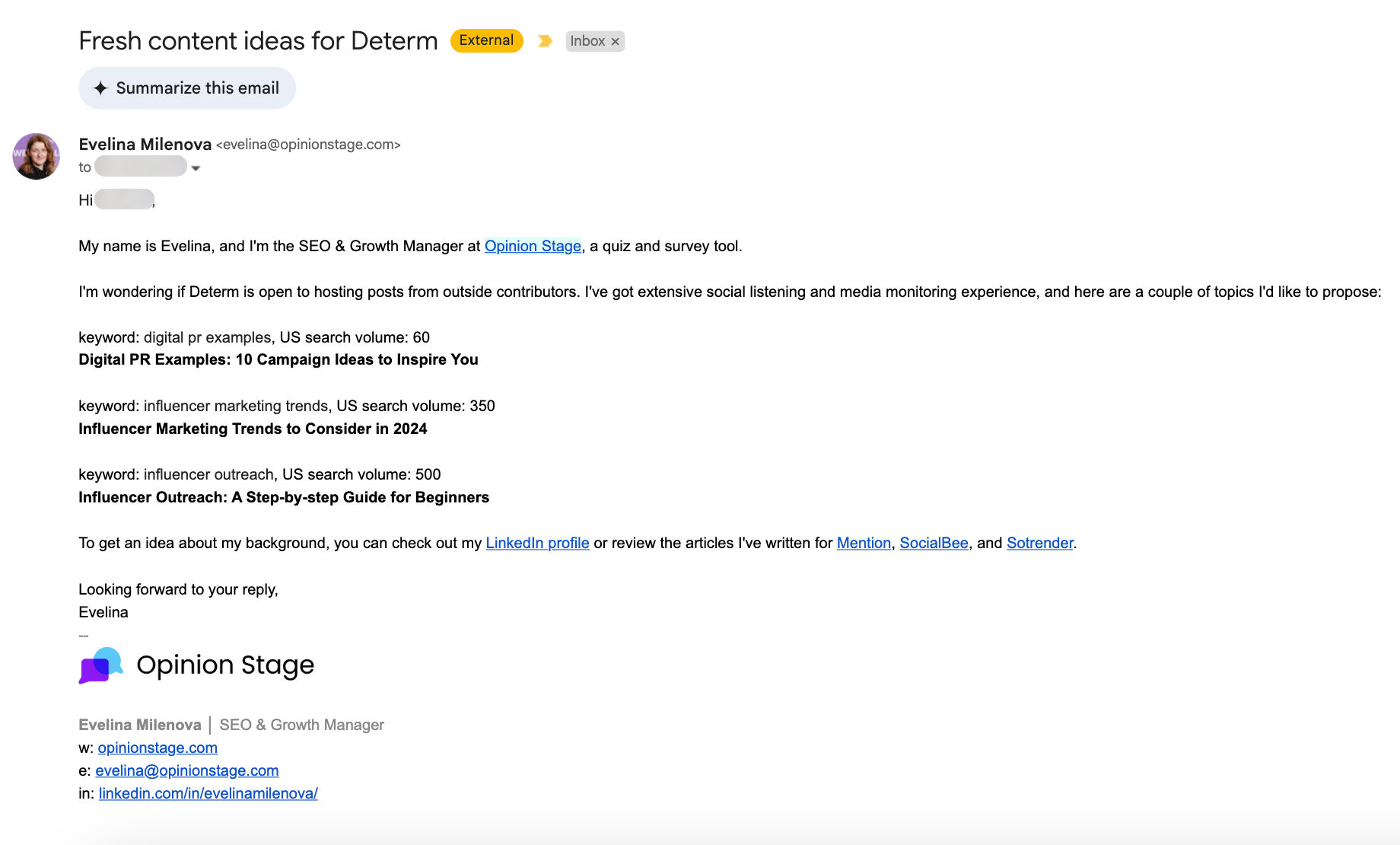
This was pitched in the marketing industry and had 69% open rate, 19% reply rate, 18% success rate.
12. Broken Link Building
Unless you write to your target post author a few days after their post has gone live, authors rarely remember the specifics of an external link they’ve placed within an article.
So, when writing a broken link building template, make it as easy as possible for your target to find and change whatever you need.
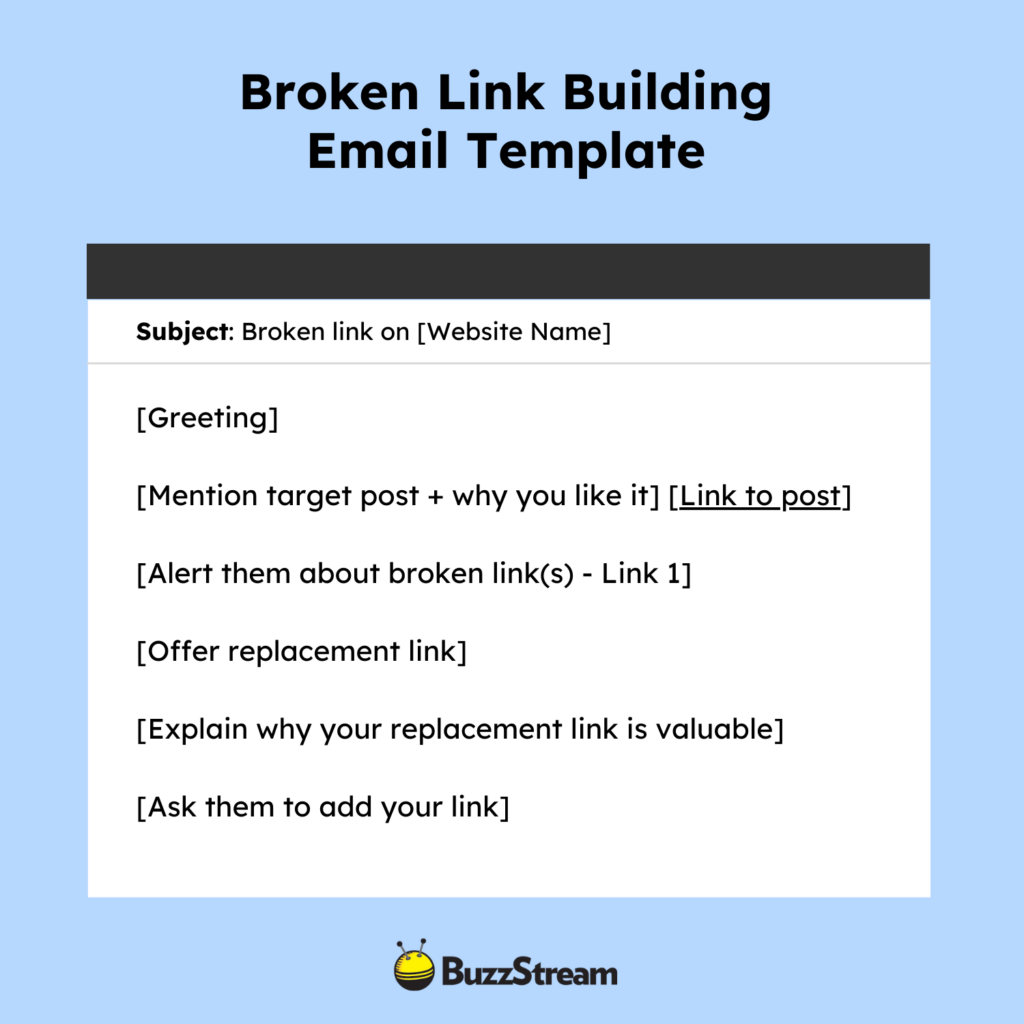
Here is a more specific broken link building outreach template:
Broken link and suggestion for [Website Name]
Hey [First Name],
I read your article on [Research Page Title] and really appreciated [Personalize]. I just thought you’d like to know that I found a broken link at [link anchor text].
I recently wrote about [topic] here [link] and wondered if you’d consider using my post to replace your broken link.
I’d really appreciate it, and I think it would help give some excellent context to your readers.
Let me know what you think!
13. Link Reclamation
Websites drop links for many reasons, most of which aren’t on purpose. So, it’s usually easy to get them to re-add the link. You just need to guide them to exactly where your link was and remind them why it was relevant to include.
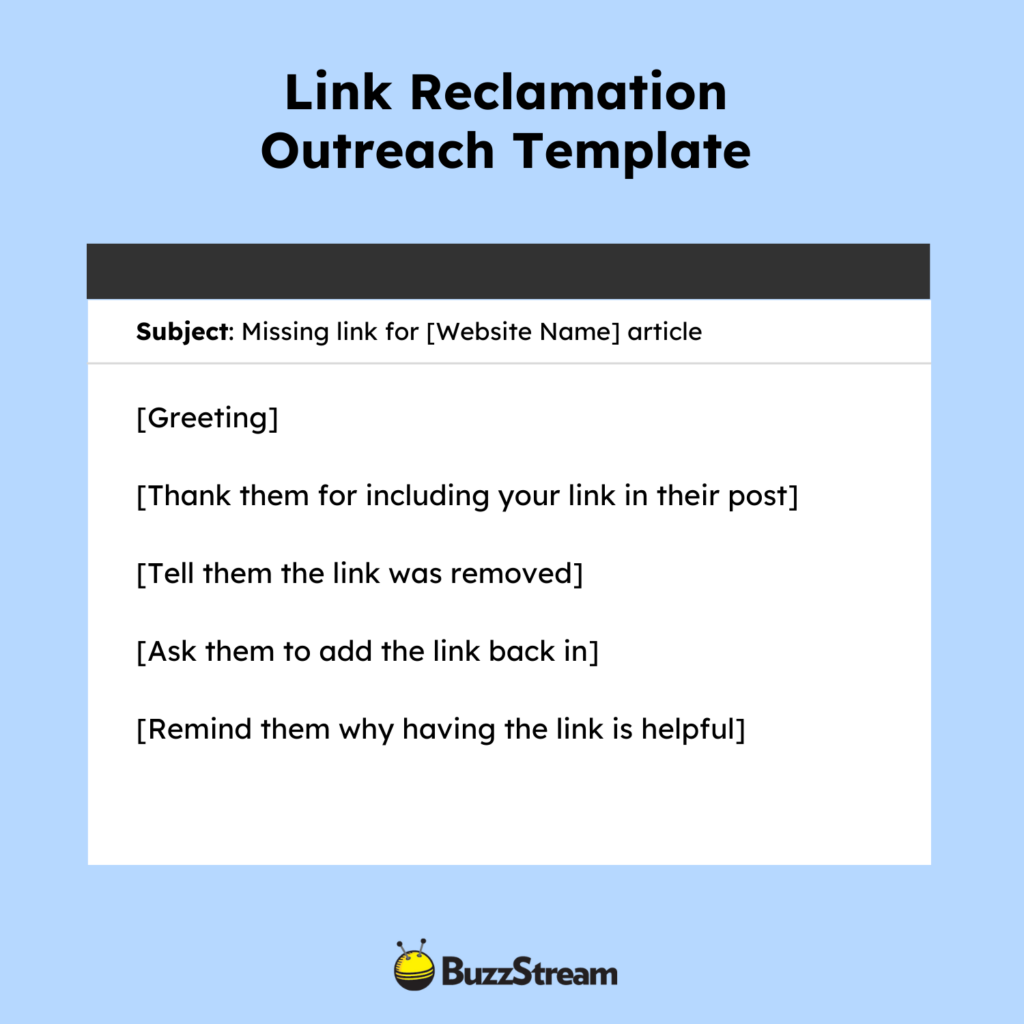
Here are more specific templates for a few different scenarios.
14. Link Was Removed
Oftentimes a link may be removed accidentally or due to a technical change on the site. Either way, you never want to appear too aggressive with your ask.
Missing link on your [Website Name] article
Hi [First Name],
I noticed [Website Name] mentioned our [brand/product] in your recent post [Research Page Title][Link].
Thanks again for mentioning us!
However, it seems like the link is missing. Would you be able to add the link to [your page link].
For reference, here is the sentence where [brand/product] was mentioned: [excerpt].
And here is our link: [link].
It would help us out a lot, plus give some more context for your readers.
Please let me know what you think.
15. Link Was Set To Noindex
Sometimes, a site might not remove your link altogether; instead, they might just add a noindex tag, rendering it virtually “invisible” for Google.
Here’s a quick email to send to get it back.
Missing link on your [Website Name] article
Hi [First Name],
Thanks again for including our link on [Research Page Title][Link]. I noticed that it’s now marked “noindex,” however.
Adding this tag removes the page from Google, which hurts the authority signals you have built up for the page.
For reference, here is the sentence where [brand/product] was mentioned: [excerpt].
Would you be able to remove the noindex tag? We’d greatly appreciate it (and we think it would help your post rank better as well!)
Please let us know!
15. Resource Page Outreach
Resource pages are pages that list multiple resources in the form of links. If you want a page to include your resource, include a compelling reason. Then, help tell them exactly where it should fit.
The more work you can do for them so they don’t have to think about it, the more likely they will help you.
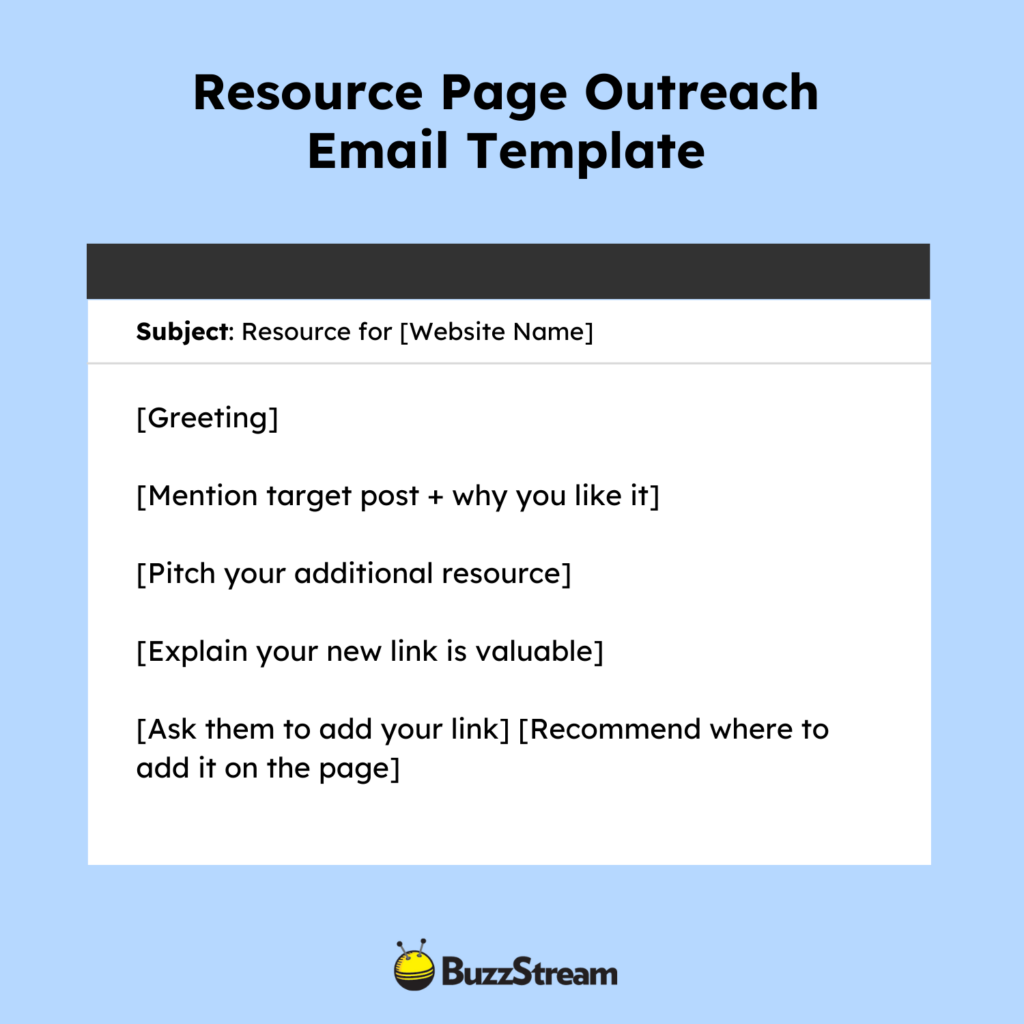
Here is a more built-out outreach template for resource page link building:
[Topic] resource for [Website Name]
Hi [First Name],
I came across your resource page on [Research Page Title] – [personalize]. I’ve created a guide on [topic] that might be a great addition to your page: [link].
It’s packed with helpful info on [brief description].
Would you consider adding it to your page? It would go great in [suggest location].
Please let me know!
16. Unlinked Mention
You can ask for the link when a site name-drops your brand but doesn’t link. Unlinked mentions are an excellent way for brands to pick up high-quality backlinks.
To make it as easy as possible for your target, tell them exactly where the unlinked mentions occur—specifically which post and where in the post.
Thanks for including [Your Brand/Site] in your article
Hi [First Name],
Thanks so much for mentioning [Your Brand/Site] in your [Research Page Title] post.
To provide further depth for your readers, would you be able to add a link to [your post]?
We think it would help give extra context for your readers (with the added benefit of sending your site some nice authority signals for Google).
Please let us know what you think!
17. Link Insertion
Getting your link inserted into a post is one of the lowest-effort link building tactics because all it takes is a compelling email. Once you find a relevant, quality site that you think would be a good fit for your link, you can dig around to find their email address and send the template below.
Complementary resource for [Website Name]
Hi [First Name],
I loved your insights on [Topic] in your recent article! [Personalize]
I noticed you mentioned [Topic]. To add depth, I wanted to share our post on [Topic], which covers [briefly explain benefits].
Including a link to our post would provide an excellent resource for your readers wanting to learn more about [topic](and boost the contextual authority in Google’s eyes, which can help SEO).
You can see our link here: [Link to your content].
I’d happily suggest a line or two to make edits read naturally.
Please let me know what you think.
18. Link Exchange/ Link Swap
I’ve spoken a bit about link exchanges. In general, I tend to avoid them because I don’t want to get caught in any low quality link networks. You can partner up with the best of sites, but if even one of them starts to lower the quality of the sites they partner with, you risk “contaminating” the rest of the partners.
That said, I spoke with Jenny Syjueco of Seene who had a rather interesting approach.
Typically a link exchange asks for the link directly. In her case, she first asks for a quote inclusion on her own website, which provides a lot of value to the recipient.
Here’s what it looks like:
Can we quote you in a piece for [Site]? | [Article Topic]
Hi [Name],
We are writing a piece for [Site] on [Article Topic], and we wanted to reach out to see if you’d be interested in contributing a quote, tip, or piece of advice for the article. We would, of course, credit you with a backlink.
We’ll send you the article before publishing to ensure you’re 100% happy with the content.
If the site or topic isn’t the right fit for you, we also have several other partner sites where we can promote your site, including:
- [Partner Site 1] (e.g., DR 85)
- [Partner Site 2] (e.g., DR 89)
In return for the PR, we’d love to secure a link in an article you write on your blog, or perhaps even collaborate on a blog pitch. For context, we write content for numerous top brands in the health/lifestyle industry, including [Brand 1], [Brand 2], and [Brand 3].
Thank you for considering this opportunity. I look forward to hearing your thoughts!
Kind regards,
[Your Name]
Jenny told me: “We get so many cold outreach emails per day, at Seene we make sure that our outreach emails have an immediate and clear value proposition (a quote in an article, along with a backlink).
The subject line is specific and mentions the recipient’s potential involvement, making it more likely to be opened, and it’s also flexible, with multiple options for involvement/collaboration. Finally, by mentioning we work with top brands like MensJournal.com and Elle, the sender establishes credibility and expertise.”
You can see it in action here:
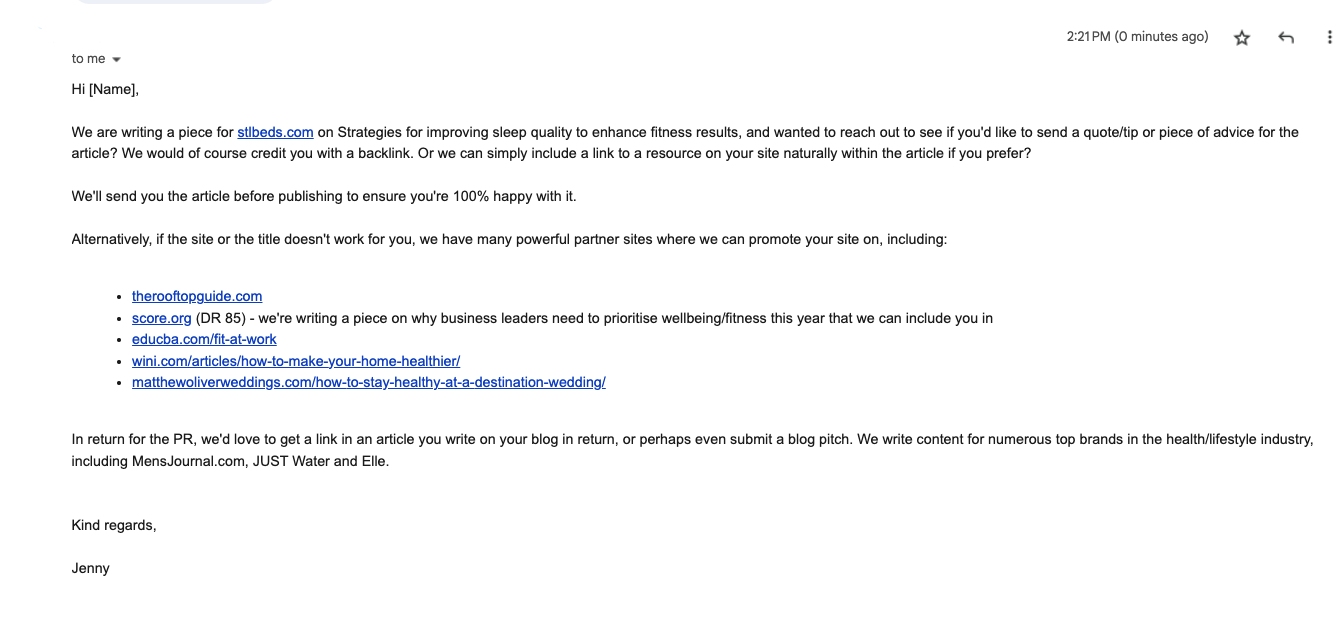
As I mentioned, I’m typically not a fan of link exchanges, but the way this was presented with the value up front makes a lot of sense to me. It’s way less transactional, which is where most link exchanges get into trouble.
She told me they have about a 5% link rate with this approach.
19. Infographic Outreach
Infographics have been used for link building for years, though interest and reliability have waned due to overuse. Ensure your post is compelling, the graphics are original and high quality, and your infographic topic is relevant to your site.
Infographic for [Website Name]
Hi [First Name],
I saw you shared [Research Page Title] (personalize).
Since you shared, you and your readers might also be interested in a post we created on [topic].
The post covers [topic] and with [specific example] and has an infographic for sharing.
You can see the full post here: [link].
We’d be thrilled if you shared it with your readers if you’re interested. I’m happy to help write a custom post, embed code, or any high-res graphics if you need them.
Please let me know.
20. Link Moves
“Link move” is a bit of a misnomer, as you are asking for a link replacement. So, pitching a link move requires you to include specifics to make things as easy as possible for your target.
Include the post, place, and new link you’d like as the replacement.
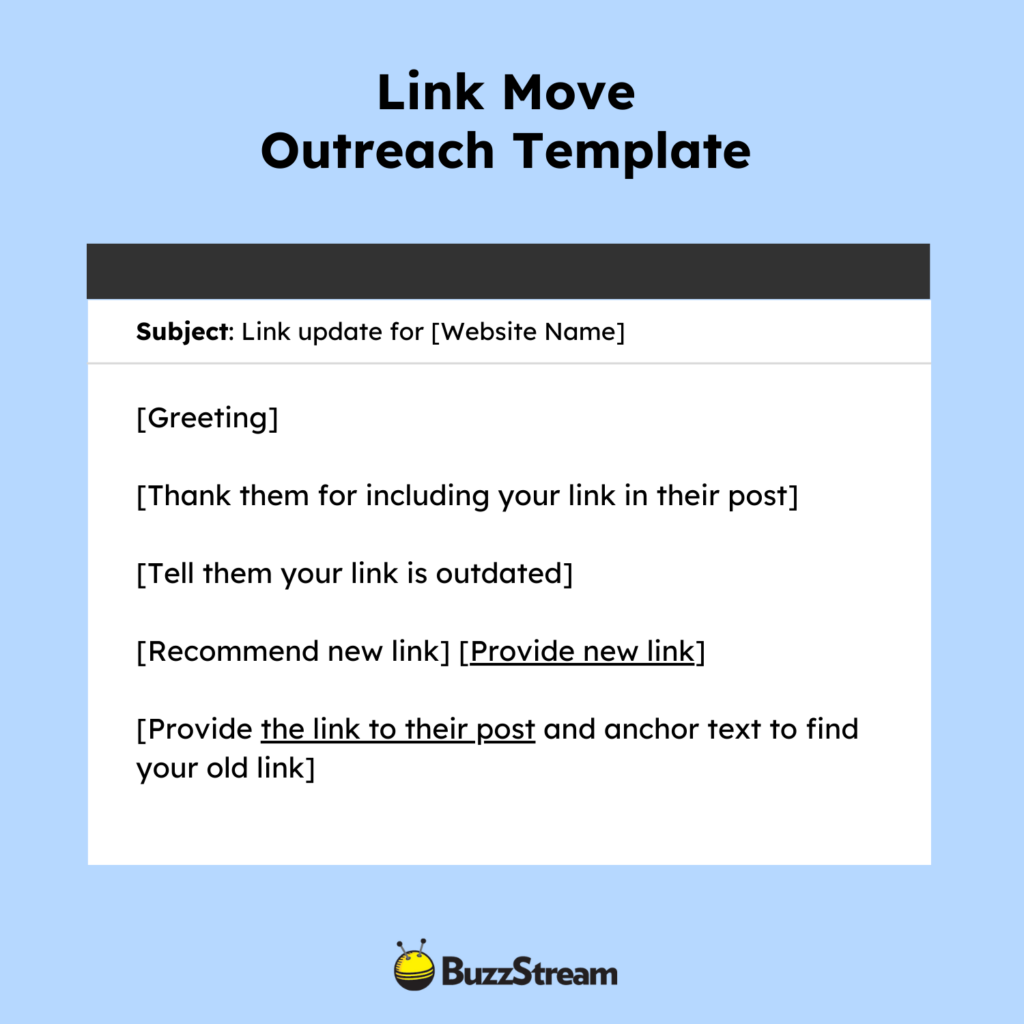
Here is a more specific link move outreach template:
Quick link update on [Website Name]
Hi [First Name],
I noticed a link on your site [target’s link] points to an outdated page. Is there any chance you could update it to our new resource here [new link]? It’s more relevant and up-to-date.
The outdated link I am referring to is [outdated link] found in located [location] using the anchor text: [anchor text].
Please let me know.
Thanks for your help!
21. Podcast Pitch
Aside from being a great brand-building technique, getting yourself featured on other people’s podcasts is an effective white-hat link building tactic.
If you can warm up a lead by reaching out on social media first, you’ll have more success. You should always try to listen to a few episodes on the podcast so that you can speak to something more specific in your email.
An outreach template for a podcast pitch would look like this:
Podcast guest for [Podcast Name]
Hi [First Name],
I’m [Your Name], a [Your Profession/Title]. I’m a listener of [Podcast Name] and really enjoyed [Specific Episode].
[Tell them why you liked it.]
With my background in [Your Field/Industry], I’d love to see if you’d consider having me on as a guest.
One topic that came to mind is [Pitch podcast topic to discuss]. [Explain why it’s a fit for their listeners.]
I’d love to discuss this further if it sounds like a good fit for [Podcast Name].
Thanks for considering!
Please let me know!
Affiliate Recruitment Outreach
Affiliate recruitment helps expand your brand’s reach and, with the proper targeting, can drive sales. Here are some best practices that ensure your outreach hits your potential affiliates.
I may sound like a broken record at this point. Still, the main focus should be personalization, with an extra eye on your value propositions and any mutual benefits of these partnerships.
22. Standard Affiliate Recruitment
Faique Moqueet, CEO of the affiliate and partnership marketing agency, Hamster Garage, mentions that “the point of the first outreach should be to open the conversation and give enough information to gain interest.
Keeping it more general will mean partners will have to reach out to learn more, which opens the door to sharing more about what you are looking for and what the partner is willing to provide so you can begin the negotiation process.”
Here’s his recommended template:
I’m an affiliate manager at [Brand]. I wanted to explore a potential partnership between [Brand] and your site. As a company, we focus on [what Brand does].
[Brand Name]’s affiliate program is currently live on [Platform] offering [commission] [Payout funnel (i.e. sales, sign up, subscription, etc). We are interested in understanding your audience, what your best partnerships look like, and what a pilot could look like. Happy to hop on a quick call, or feel free to join the program here [link to joining program].
Looking forward to connecting soon!
23. Product Review
Building reviews for your product can drastically influence product sales and exposure. About 75% of users read reviews to learn about a new product, according to a study from PowerReviews.
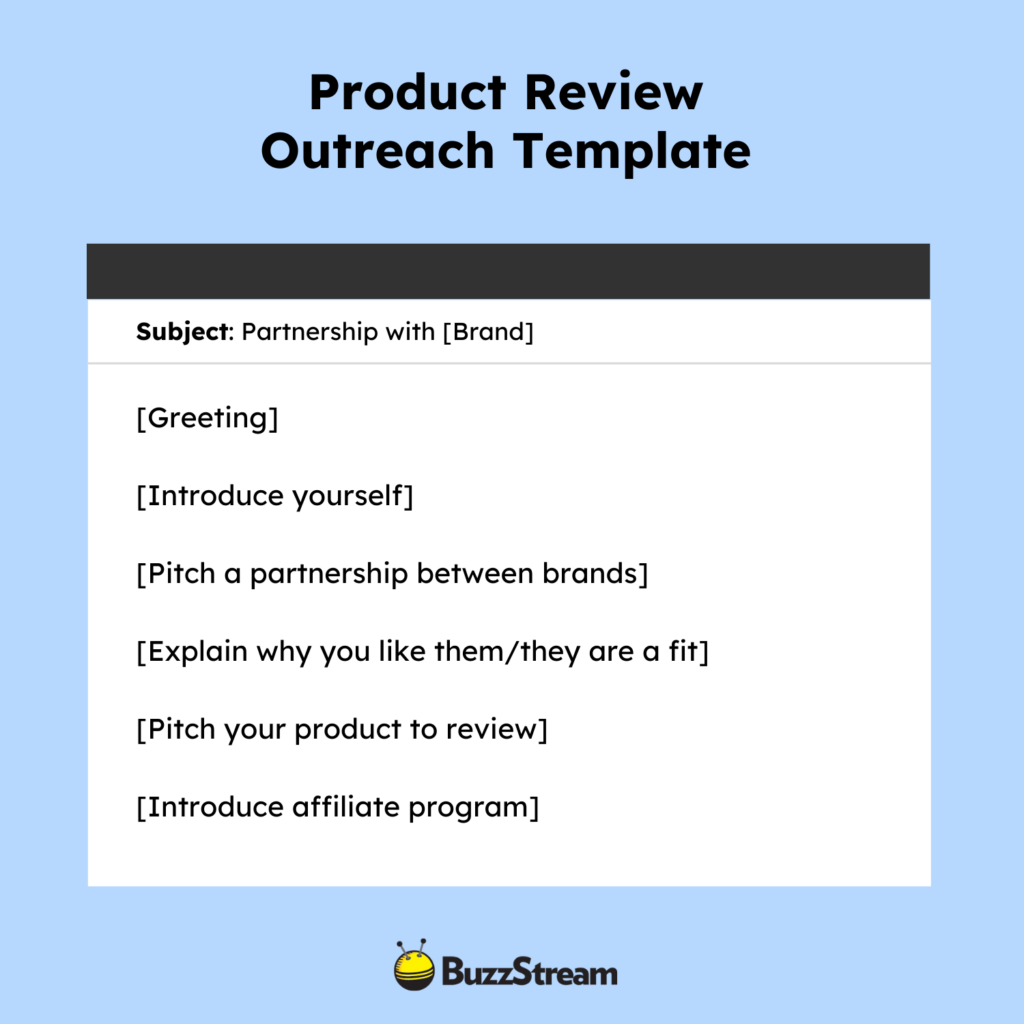
Faique offers two different, more specific approaches.
I’m an affiliate manager at [Brand]. I wanted to explore a potential partnership between [Brand] and your site. As a company, we focus on [what Brand does].
We love your site and think you’d be a great partner for [Brand]. We would love to share [specific sample product] for you to try and experience. If you really like it, we would love to have you join our affiliate program and earn commissions for telling your audience about it!
Let us know if you’re interested in learning more. We would love to have you as a partner.
24. A More Detailed Product Review Approach
Faique recommends not thinking about it like you are soliciting a product review but rather you are building a partnership. “If you are reaching out for a specific kind of partnership, you need to be specific about what you are looking for and how it would relate to the partner.
They will be looking to see what the benefit of the collaboration would be for them and how it would relate to current content.
Being open about flexibility around communication can help start a conversation and engaging the potential partner. ”
Here’s a more detailed template:
I’m an affiliate manager at [Brand X]. I wanted to explore a potential partnership between [Brand X] and your site. As a company, we focus on [what Brand X does].
Our [product] offers [brief description of the product’s key features and benefits]. Given that your expertise in [partner’s content focus] aligns well with our brand, would you like to review our product and potentially create a product review?
Our program is on the [platform] platform and we can offer [commission structure], but we have some flexibility here. We can also provide all necessary creative resources like high-quality images and any product information you need.
Let us know if you’re interested in learning more. We would love to have you as a partner.
Influencer Outreach
Influencer outreach is becoming a much more powerful strategy in digital marketing than ever, with apps like TikTok continuously dominating usage reports.
Below are templates designed to effectively engage influencers for product promotions, collaborations, or brand endorsements.
25. Collaboration Invite
Remember to approach all emails to stress that you are building a beneficial relationship where your brand and the influencer can grow and succeed together.
I’m reaching out from [Your Site/Company], where we [briefly describe what your company does]. Your passion for [Topic/industry] shines. I loved your [personalize].
We think a collaboration could be mutually beneficial.
We’re particularly interested in [describe the proposed collaboration idea]. This could include [mention specific details or incentives]. What are your thoughts on this?
Hope to connect soon!
26. Event Invite
Inviting influencers to your event is a strategic move to magnify your event’s reach. The key to this email is the exclusive invitation, which flatters the influencer and leverages their presence to attract their audience.
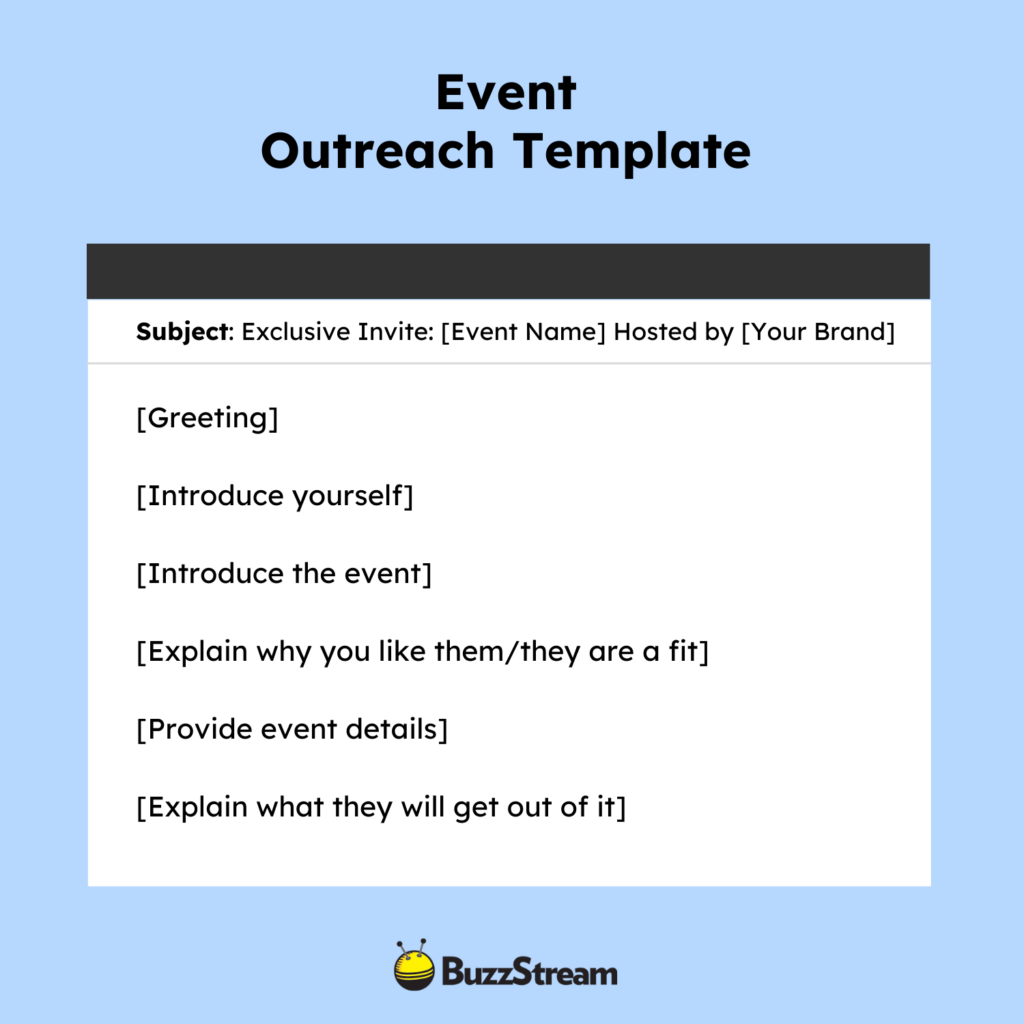
Here is a more specific invite email template:
Exclusive Invite: [Event Name] Hosted by [Your Brand]
Hi [First Name],
I’m [Your Name] from [Site/Company], and we’re hosting [Event Name], an event that celebrates [describe the event theme or purpose].
Since you are a top influencer in [Industry], we’d be thrilled to have you join us on [date] at [venue].
It’s an excellent opportunity to network and enjoy [mention any special features of the event], and we’d love to feature you in our [media coverage/social media].
Please let me know if you can make it!
Follow Up Email Templates
Follow-ups have proven to be very impactful in boosting reply rates. In one follow-up email study, we found that reply rates for campaigns with follow-ups almost doubled.
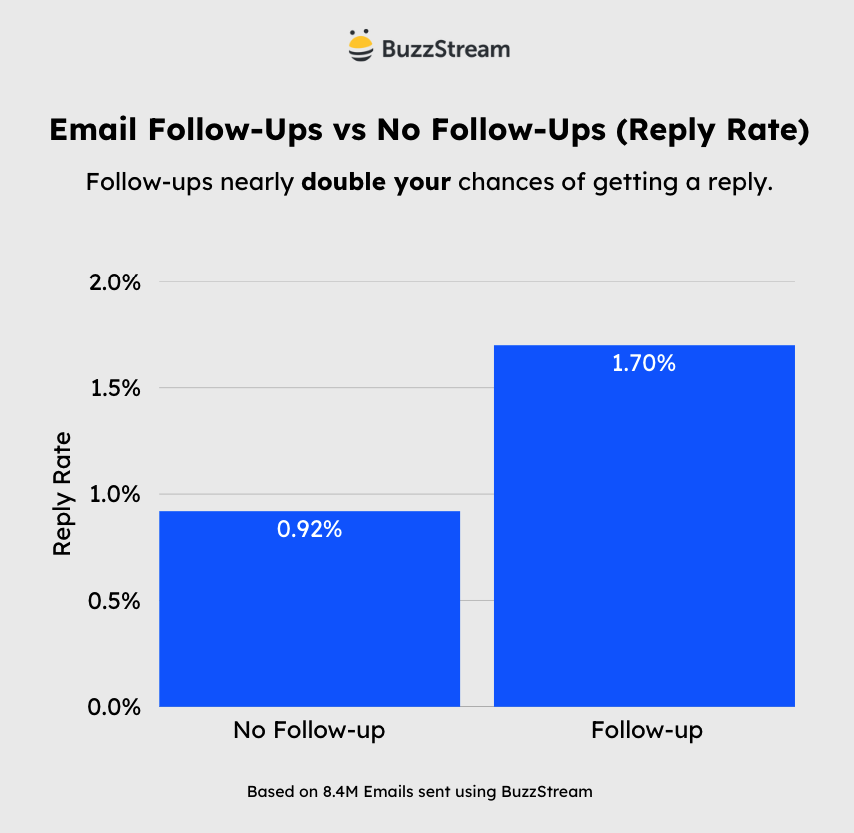
Follow-up emails can be effective for PR, link building, and other marketing-related email outreach campaigns.
The question is, how many emails should you send?
While there isn’t a clear answer, it is somewhere between one and two emails.
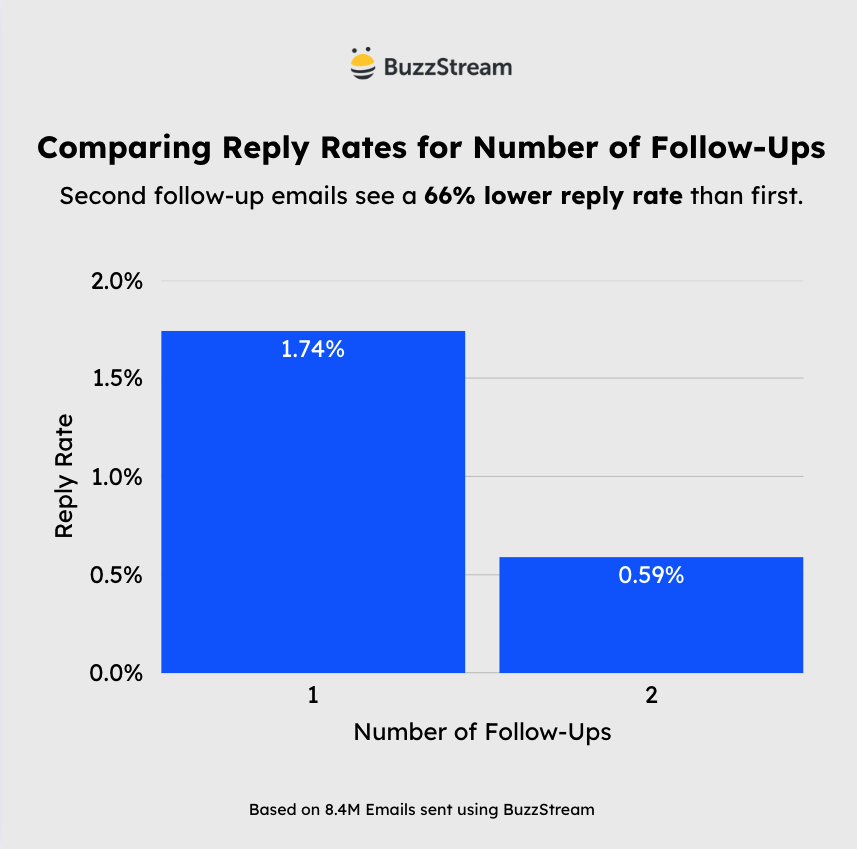
The reply rate drops significantly after the first email in digital PR.
27. First Follow-Up
Based on our research, you should send these 1 day after the first email if no one responds. Use the same email thread.
Hi [First Name],
I am following up to see if you had a chance to view [my request/link/my email].
As a reminder [recap the ask in one sentence].I’d love to know what you think.
Thanks!
28. Second Follow-Up
If necessary, a second follow-up can be five days to one week later.
Hi [First Name],
One last follow-up to see if you viewed [my request/link/my email].
Please let me know if you’re interested.
Thanks!
29. Personalized Follow-Up
While this approach isn’t something you can quickly scale, it is much more effective than others. You want to mention something recent that they did to show that you are following and genuinely interested in their work.
Hi [First Name],
I just saw [mention recent Post Title, Tweet, LinkedIn post, etc] [Personalize].
I am following up to see if you had a chance to view [my request/link/my email].
As a reminder [recap the ask in one sentence].
I’d love to know what you think.
Thanks!
30. New Angle Follow-Up
Gisele Navarro from NeoMam Studios recommends utilizing the follow-up pitch to unresponsive contacts as an opportunity to try completely new angles and approaches to your pitches:
- Offer new insights that you didn’t utilize in your initial pitch
- Conduct additional research or data analysis to uncover new findings
- If the topic allows, incorporate an emoji into your subject line to make your email stand out
- Experiment with the presentation of your email — Could you embed a striking visual? What about utilizing shaded containers to highlight important points?
- Always include a link where recipients can find all the assets ready for download
When you follow up with unresponsive targets, you have nothing to lose. Make your follow-up emails count by trying new things beyond the ‘Just following up on the story I sent last week.’
Using AI to Write Your Outreach Template
We partnered with Fractl to create a survey where 500 respondents working in the media evaluated AI-generated pitches.
We found that 79% found the pitches convincing, and 71% reported them being of high or very high quality.
Does this mean this whole post is obsolete? Not at all.
Before using AI to draft your pitches, there are a few things to remember.
- AI cannot personalize email without prompting.
- AI makes mistakes, so it’s critical to proofread anything before you send
What is the Format For a Successful Outreach Email?
While all outreach emails are unique, there are a few main sections to hit in every email template you create. Traditionally, the format looks something like the below:
Purpose: Clearly and succinctly explain why you are reaching out to them. Whether you are looking to collaborate, asking for a link, or setting up a call, be sure to state what you want.
Personalization: Some type of personalization should happen early in the email to hook the reader and let them know you are a real person. You can reference something in their bio, a recent blog post, a social post, or an email.
Value Proposition: Explain what’s in it for them. What are the mutual benefits of establishing this relationship together?
Call to Action: Specify what action you want your target to take. If the answer from the recipient is “OK, what am I supposed to do with this?” (a real answer I once got), adjust your template to ensure you are including a clear ask.
C.H.A.M.P. Outreach Method
I outline this more in the C.H.A.M.P. outreach method post, but in essence, the C.H.A.M.P. outreach method encapsulates the best practices found throughout this post.
C.H.A.M.P. stands for:
- Connect
- Help
- Adapt
- Make it Scannable
- Personalize
The method focuses on making immediate connections with recipients, offering a clear value, matching the communication style, and ensuring everything is readable (on any viewing device) and highly personalized.
Ultimately you end up with something like this:
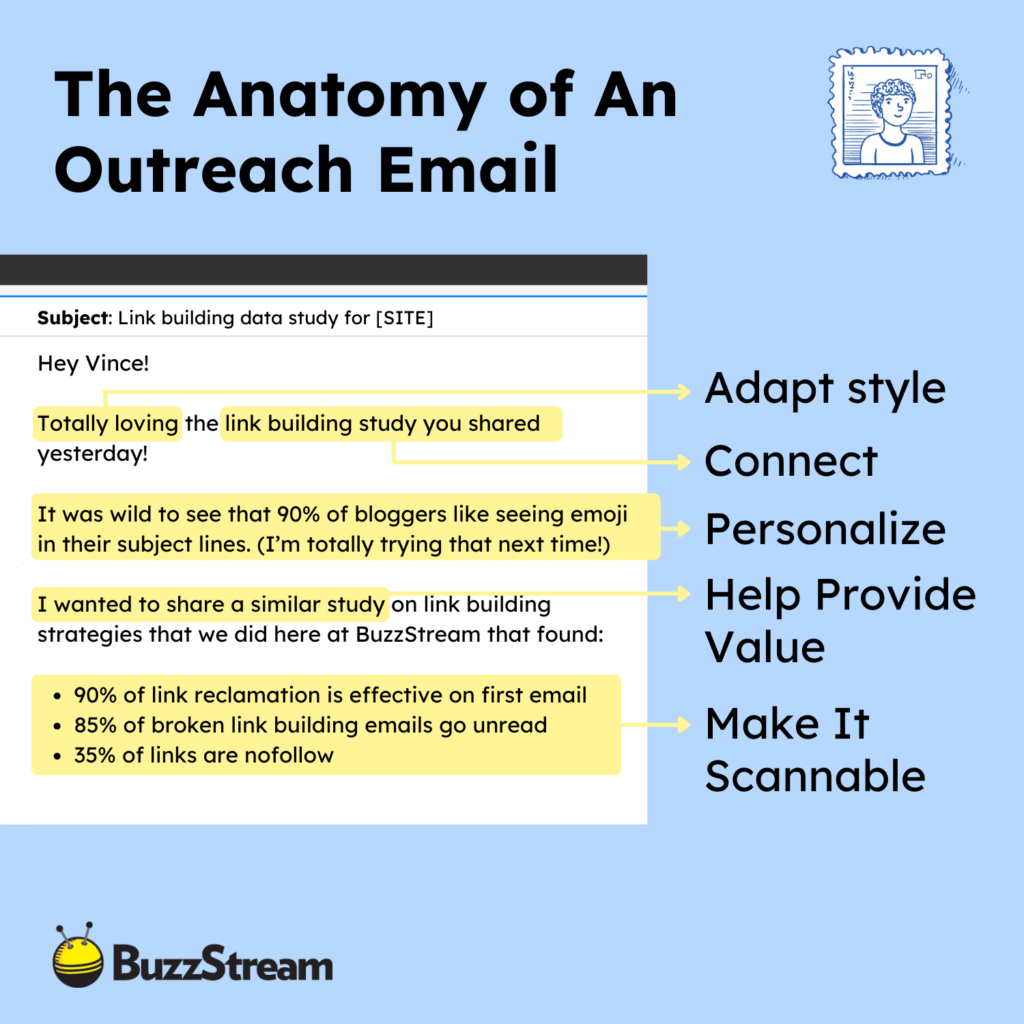
This format is ideal for a targeted outreach approach, though bulk senders can benefit from a similar approach.
How Do I Create An Outreach Template?
There are many tools available for sending outreach templates.
In BuzzStream, simply start a new project, choose Sequences, and then you can set up either an individual template or an automated sequence.
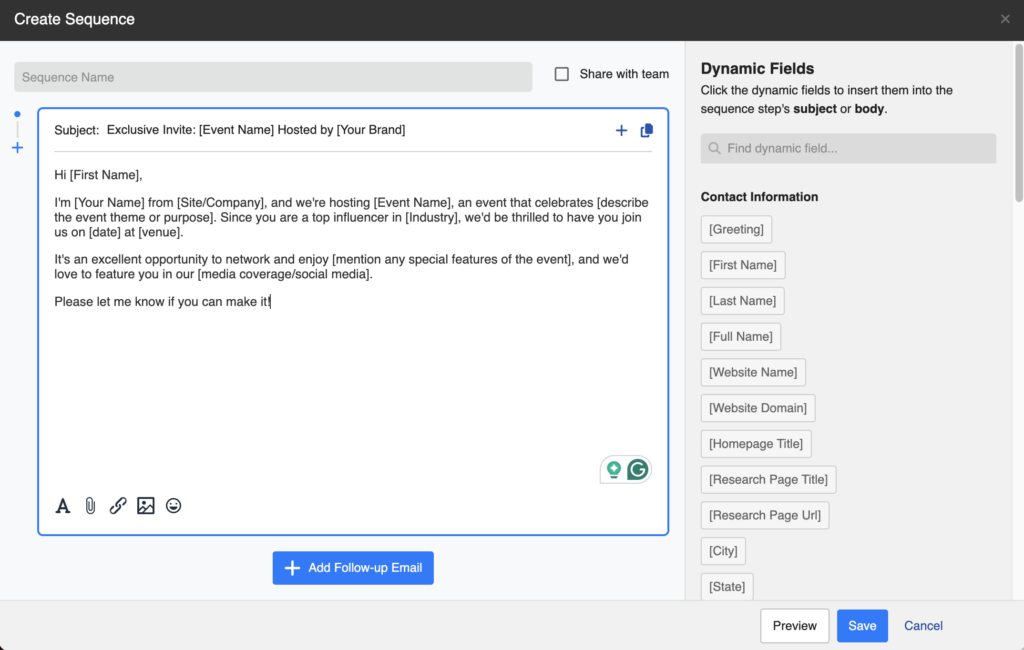
Copy and paste any of the templates above to set up your outreach template. Use the Dynamic Fields or create your own.
If you’ve created a Sequence, you can add follow-up emails.
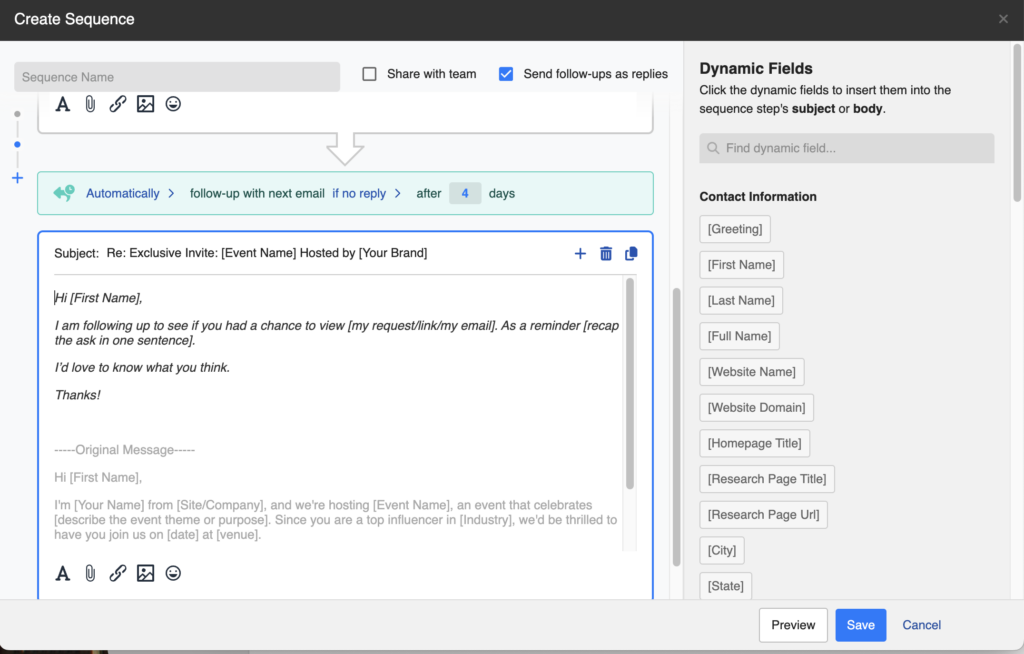
Then, when it’s time to do any outreach, you can choose your template or sequence and it will automatically pull in any of the Dynamic Fields.
Learn more about setting up projects and outreach templates with BuzzStream.

 End-to-end outreach workflow
End-to-end outreach workflow



 Check out the BuzzStream Podcast
Check out the BuzzStream Podcast

